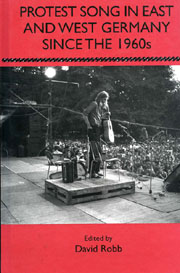Book contents
- Frontmatter
- Contents
- Acknowledgments
- Introduction
- 1 The Reception of Vormärz and 1848 Revolutionary Song in West Germany and the GDR
- 2 Mühsam, Brecht, Eisler, and the Twentieth-Century Revolutionary Heritage
- 3 Narrative Role-Play as Communication Strategy in German Protest Song
- 4 The Burg Waldeck Festivals, 1964–1969
- 5 The Folk and Liedermacher Scene in the Federal Republic in the 1970s and 1980s
- 6 Konstantin Wecker: Political Songs between Anarchy and Humanity
- 7 Wolf Biermann: Die Heimat ist weit
- 8 Political Song in the GDR: The Cat-and-Mouse Game with Censorship and Institutions
- 9 The Demise of Political Song and the New Discourse of Techno in the Berlin Republic
- Works Cited
- Notes on the Editor and Contributors
- Index
3 - Narrative Role-Play as Communication Strategy in German Protest Song
Published online by Cambridge University Press: 05 February 2013
- Frontmatter
- Contents
- Acknowledgments
- Introduction
- 1 The Reception of Vormärz and 1848 Revolutionary Song in West Germany and the GDR
- 2 Mühsam, Brecht, Eisler, and the Twentieth-Century Revolutionary Heritage
- 3 Narrative Role-Play as Communication Strategy in German Protest Song
- 4 The Burg Waldeck Festivals, 1964–1969
- 5 The Folk and Liedermacher Scene in the Federal Republic in the 1970s and 1980s
- 6 Konstantin Wecker: Political Songs between Anarchy and Humanity
- 7 Wolf Biermann: Die Heimat ist weit
- 8 Political Song in the GDR: The Cat-and-Mouse Game with Censorship and Institutions
- 9 The Demise of Political Song and the New Discourse of Techno in the Berlin Republic
- Works Cited
- Notes on the Editor and Contributors
- Index
Summary
Of all the communicative strategies the twentieth century political song has employed, one of the most creative and effective has been that of narrative role-play. It provides a good example of how Gebrauchslyrik (as discussed in chapter two) has functioned by playing to the knowledge and cultural styles and tastes of a target audience. With the term narrative role-play I mean, first, variations on the literary Rollengedicht or dramatic monologue, in which the singer assumes an identifiable role, impersonating the language, mannerisms, and characteristics of known social types. An example of this is Franz Josef Degenhardt, who, as a representative of West German alternative culture in the 1960s, parodied conventional figures of the establishment in his songs. Second, I refer to the narrative identities constructed by singers and performers either by means of literary association (for example Wolf Biermann's frequent references to Villon, Brecht, Hölderlin, and Heine) or by association with certain political ideas or stances (for example, Ernst Busch or Gerhard Gundermann embodying the proletarian worker or Konstantin Wecker's identification with anarchy and hedonism). Unlike the Rollengedicht of Degenhardt, these role-plays are frequently non-ironic and equate the singer with the role itself, although aspects of society can still be parodied from the standpoint of that role. A variation on this is the role-play of Hans-Eckard Wenzel and Steffen Mensching, who in their performances in the 1980s as a duo or with the group Karls Enkel assumed the ironic masks of clowns, which they used to present an alternative vision of GDR society in their songs.
- Type
- Chapter
- Information
- Protest Song in East and West Germany since the 1960s , pp. 67 - 96Publisher: Boydell & BrewerPrint publication year: 2007



